
Gravity is not behind the accelerated expansion of universe: Study
What's the story
The universe has been expanding since the Big Bang. The first eight billion years saw a relatively constant expansion rate. However, for the last five billion years or so, the rate of expansion has been accelerating. Some say that this is gravity's doing. Now, a study has found that the nature of gravity has remained constant throughout the history of the universe.
Context
Why does this story matter?
The finding of the new research that gravity has remained constant throughout the history of the universe has proved that the predictions of the General Theory of Relativity are accurate. However, this opens more questions about Dark Energy. But with more advanced telescopes like ESA's Euclid and NASA's Nancy Grace Roman Space Telescope, we may soon find the answers to those questions.
About the research
The study was conducted by Dark Energy Survey collaboration
Most scientists attribute the universe's accelerated expansion to a mysterious force called Dark Energy. There are some who claim that the force of gravity is behind this. If the latter is true, that would disprove Einstein's General Theory of Relativity. A study by the international Dark Energy Survey (DES) collaboration has found that gravity is not the culprit behind the universe's accelerated expansion.
Discrepancy
Einstein's theory was doubted between the 1960s and 1990s
Einstein's theory says that the curvature of spacetime gets altered in the presence of gravity. This theory has been instrumental in accurately predicting almost everything about our universe. However, between the 1960s and the 1990s, astronomers noted two discrepancies in Einstein's theory. One of them was how the gravitational effects of massive cosmic structures did not match up with their observed mass.
Alternative view
Theory of Dark Energy explains the accelerated expansion of universe
The skepticism of Einstein's theory led to three things. It gave rise to a theory that space is filled with invisible mass that interacts with visible matter via gravity. At the same time, the observed accelerated expansion of the universe birthed the theory of Dark Energy and the Lambda Cold Dark Matter (Lambda CDM) cosmological model.
Modifications
Einstein's theory has to be modified to account for discrepancies
According to the Lambda CDM model, the 'invisible mass' is composed of large, slow-moving particles. Lambda represents Dark Energy. Theoretically, these two forces constitute 95% of the total mass-energy content of the universe. However, there is no evidence to prove this. The only other way to explain this is to modify Einstein's theory to account for this discrepancy.
Observations
Members of DES observed galaxies 5 billion light years away
Using the Victor M. Blanco 4-meter Telescope at the Cerro Telolo Inter-American Observatory in Chile, the members of DES tried to determine if gravity has changed over the past five billion years or over cosmic distance. For this, they observed galaxies up to five billion light years away. They also studied data from other telescopes, including the ESA's Planck satellite.
Conclusion
Observations of DES team matches predictions of Theory of Relativity
In the images, the DES team saw subtle distortions due to dark matter (gravitational lenses). As we saw in the first image by the James Webb Telescope, the distortion of spacetime by gravitational lenses can help scientists infer the strength of gravity. The team observed over 100 million galaxies. All their observations match the predictions of the General Theory of Relativity.
Team work
The findings were published in the journal 'Physical Review'
The DES collaboration includes researchers from the US, UK, Canada, Chile, Spain, Brazil, Germany, Japan, Italy, Australia, Norway, and Switzerland. The findings of the team were presented at the International Conference on Particle Physics and Cosmology. They were also published in the journal Physical Review titled "Dark Energy Survey Year 3 Results: Constraints on extensions to Lambda CDM with weak lensing and galaxy clustering."